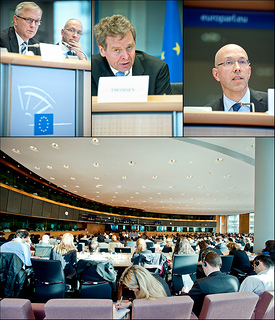This weekend, the runner-up party in the recent Greek election, Syriza, seemed to rule out joining with New Democracy and PASOK to give them a majority in parliament. Instead, Syriza cheekily invited a smaller rival left-wing party, Democratic Left, to drink from that poisoned chalice in their place.
At least in the short term, this looks like excellent political hardball on the part of Syriza. They either get to go into opposition in the new parliament while their opponents further discredit themselves. Or there will be another election in June, in which Syriza seems positioned to make further gains — perhaps enough to form a government.
Syriza then proposes to apply the same hardball approach to the European Union and to the International Monetary Fund.
At issue is a restructuring proposal the EU and the IMF seek to impose on Greece in return for another bailout.
The IMF recently published an interesting state-of-play report on the details as it sees them. This report rewards a careful read, notwithstanding its sometimes Orwellian language.
A few highlights:
– Greece’s GDP has declined by 13 per cent since 2009.
– Private bond investors were recently required to accept a “haircut” in the value of Greek bonds. One of the effects of this default-by-agreement is that substantially all of the “Tier 1 capital” underlying Greek banks was wiped out (four banks representing 44 per cent of the Greek banking system will have all of their Tier 1 capital destroyed by this transaction. The EU and the bank of Greece are backstopping the banking system to avoid its collapse). Meanwhile Greek bank customers have withdrawn almost a third of their deposits — not quite a run, but a brutal downsizing by any measure. None of this can be good for business or personal lending.
– The IMF reports that Greek incomes have dropped by about 10 per cent since 2010, hours worked have dropped by 7 per cent, and unemployment (especially youth unemployment) is skyrocketing. That isn’t good enough for Greece’s lenders, who are looking to the Greek government to engineer a further direct assault on the country’s minimum wage, labour standards, pensions and collective bargaining with the aim of imposing a substantial further drop in income. Manufacturing output in Greece has dropped by 50 per cent; tourism by 10 per cent. By further impoverishing the working people of Greece, the country’s lenders are hoping to engineer a more “competitive” economy that will return, at some point, to growth.
– The IMF is also eyeing the rich. It notes with unusual clarity that the Greek tax system is fundamentally broken. For example, “income tax returns are usually false with very low levels of income returned.” Greece’s lenders are prodding the government to substantially beef up its tax enforcement and, they say more-or-less, to aggressively go after wealthy tax avoiders.
The IMF acknowledges frankly that the steps Greece’s lenders seek to impose on the country are making its economy worse and are therefore suppressing government revenues — requiring the country to borrow more and thus to dig itself deeper into debt. The IMF nevertheless sees a road forward that might ultimately have the country land on its feet, somewhat along the lines of a brutal restructuring imposed a few years ago on the former Soviet Baltic Republics.
But only if nothing further goes wrong. Which brings us to the political crisis paralyzing the country.
By speaking for the overwhelming majority of the public, who seem determined to reject these EU/IMF proposals, the country’s opposition democratic socialist parties in some combination would seem to have an excellent shot at taking control of the government, now or after a new round of elections.
Then will come the hard part — weaving together other tools in the toolbox to put together a solution that might be more likely to succeed, and that might command greater public support, than the medicine currently on offer from the EU and the IMF.
What are those tools? Among them, perhaps:
– A successful renegotiation of the EU/IMF package after a round of hardball bargaining, the solution proposed by Syriza, consistent with its style. That might work — although the EU is clearly setting up its own bargaining position by talking up the only obvious alternative to this, which is:
– An abrupt exit from the Euro and the launch of a new, likely-to-be quickly devalued drachma. Devaluation would hold out hope of addressing the price competitiveness of the Greek economy. And, perhaps, set up a solution to Greece’s debt problem, a solution with a very long history in Europe — a round of high inflation, with all of its social and economic consequences.
Would this serve the public interest in Greece better than the harsh EU/IMF demands currently on the table? There are big stakes behind that question. A fascist party complete with a swastika-like emblem, Golden Dawn, lies in wait if the democratic socialist opposition discredits itself in its turn by misplaying its alternative.
Canadians owe the people of Greece our solidarity in the face of this overwhelming crisis. A large Greek-Canadian community is living its consequences through their families. We also owe ourselves a detailed understanding of all of this. So that we can bear it in mind the next time a populist politician tells us that taxes can be cut easily, spending can be increased easily, and the budget can be balanced easily — a formula we have been experimenting with recently in our modest Canadian way. Look how that is working out for Greece.
This article was first published in the Globe and Mail.



